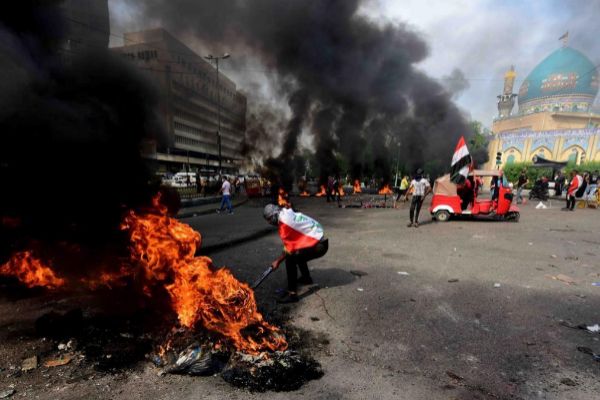- Protests Irak, paralyzed after a new violent day that leaves at least 25 dead
- Near East: Post-Saddam Iraq is reeling: 42 dead and more than 2000 wounded in a new day of protests
A month after the first protests, the response in the streets of Iraq grows. The protesters have managed to close traffic on Sunday the main arteries of the center of Baghdad after extending a strike decreed in schools and to which other unions have joined. The paralysis affects the main port of the country since last week, among the timid government attempts to calm the crowd.
"Roads closed by order of the people" , says a sign placed on one of the access routes to the center of Baghdad. The wave of protests, which began at the beginning of last month and has resulted in 250 deaths and thousands of wounded , resumed strongly on October 25 after two weeks of pause imposed by police repression. In the last week, the demonstrations - fueled by corruption, the lack of public services and youth unemployment - have elevated the government to the government and challenged the curfew in force.
This Sunday, university students - the first to lead the outrage - have collapsed the accesses by parking the vehicles in the main streets of the Iraqi capital, before the impassive gaze of law enforcement officers. The national strike, launched last week by the teachers' union, has remained in force this Sunday, the first day of the working week in Iraq. The association of engineers, lawyers and doctors have joined the call .
"Protesters are blocking roads in Baghdad and other provinces and have declared civil disobedience. There is no official communication," Ali Adil tells EL MUNDO from Iraq. Government offices have not been able to open their doors either. The main hot spot in Baghdad is located on the bridge "Al Gumhureya" (The Republic, in Arabic) that leads to the fortified Green Zone, where the most virulent clashes between protesters and security forces have taken place in the last week. At least one protester died and 91 others were injured on Saturday.
On Friday, the central Tahrir Square - the center of the answer - witnessed the most massive protests since the fall of Saddam Hussein in 2003. The clamor has also spread throughout the south of the country, mostly Shiite. The port of Umm Qasr, located in the southern city of Basra and the main access route for imports, has been closed since Wednesday.
The Ministry of Commerce has recognized this Sunday that the blockade of nearby roads decreed by protesters, after several attempts to disperse them, is preventing the unloading of basic products , aggravating a crisis that the political elite that governs the country since the US invasion did not He has managed to weather.
The reforms proposed last month by Prime Minister Adel Abdel Mahdi have not mitigated popular demands, backed by religious authorities and part of Parliament. "The status quo is unsustainable. We need major changes," Iraqi President Kurdish Barham Salih admitted Friday after proposing a modification of the electoral system that allows election of representatives by district rather than through closed lists of parties. The bill would have to be discussed this week in the Hemicycle.
"There is no security solution. We reject repression and the use of force and violence. The solution is in the reforms, " Salih demanded. The violent response of the security apparatus, in which Shiite militias are integrated, has multiplied the accessions in the streets. Amnesty International has denounced the use of tear gas canisters launched by agents as if they were "grenades", causing "horrible wounds and even death after the grenade is embedded in the skull."
The organization has also identified the use of real ammunition to disperse protests such as the one that emerged last Tuesday night in the city of Kerbala, in which at least 14 people died and more than a hundred were injured. Despite the violence, the protests continue in several locations in the south of the country.
In a desperate attempt to stop the agitation, the 'premier' has offered in letter to present his resignation if the main and rival forces of Parliament agree to a relief, a measure demanded for weeks by Shiite cleric Muqtada al Sadr and his alliance, the First political force of the country. "The prime minister has expressed his willingness to send his resignation, calling on the political blocs to reach an acceptable alternative," Salih said.
Government promises have so far encountered a reality that for years has marginalized broad sectors of the population. According to World Bank data, one in five Iraqis lives below the poverty line while youth unemployment stands at 25 percent. The second largest producer of the Organization of Petroleum Exporting Countries (OPEC) is also the twelfth most corrupt country on the planet.
According to the criteria of The Trust Project
Know more- Iraq
Repression At least 15 dead in another day of the endless and bloody wave of protests in Iraq
Middle East Dozens killed in a violent wave of anti-government protests in Iraq
Middle East Royal mission against civilians and dozens of dead: the keys to violence in Iraq

